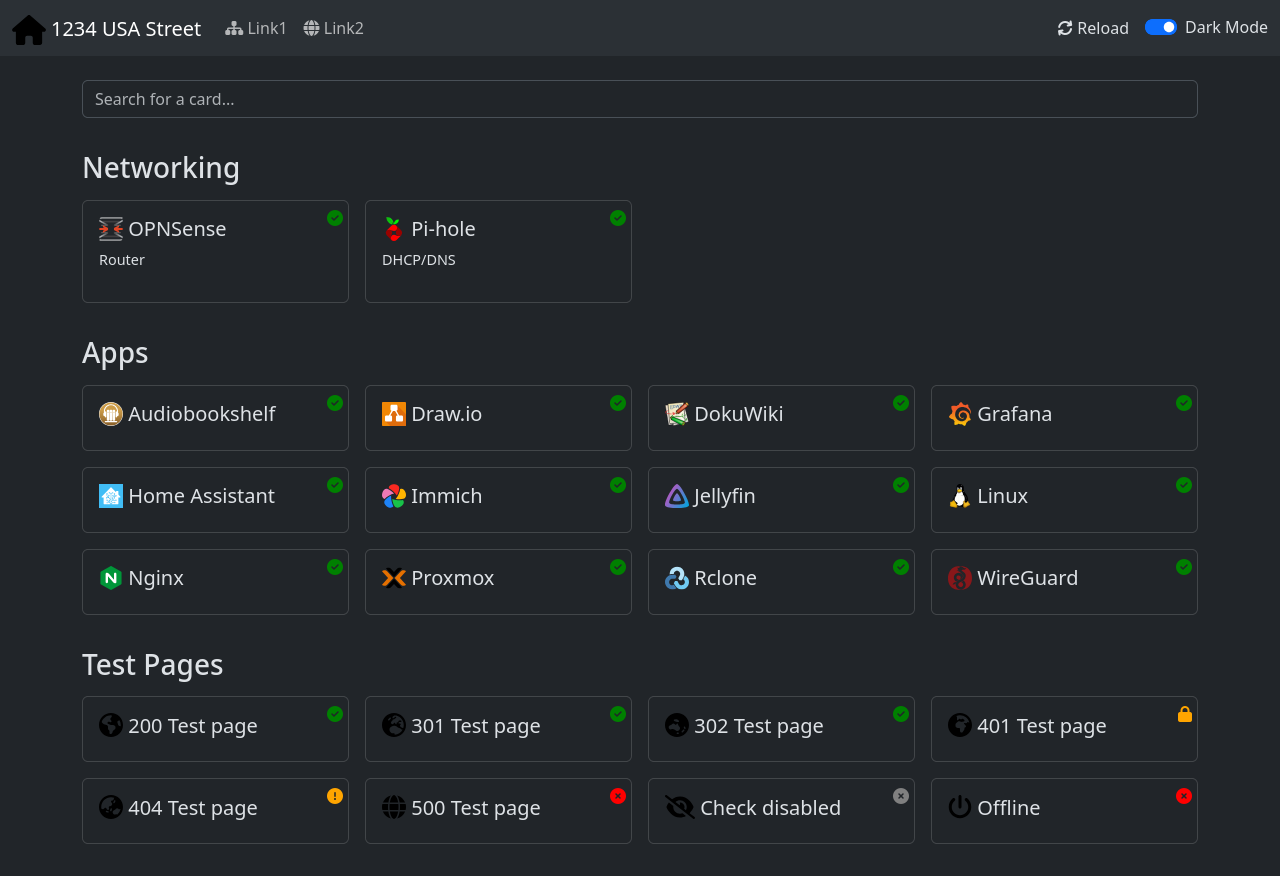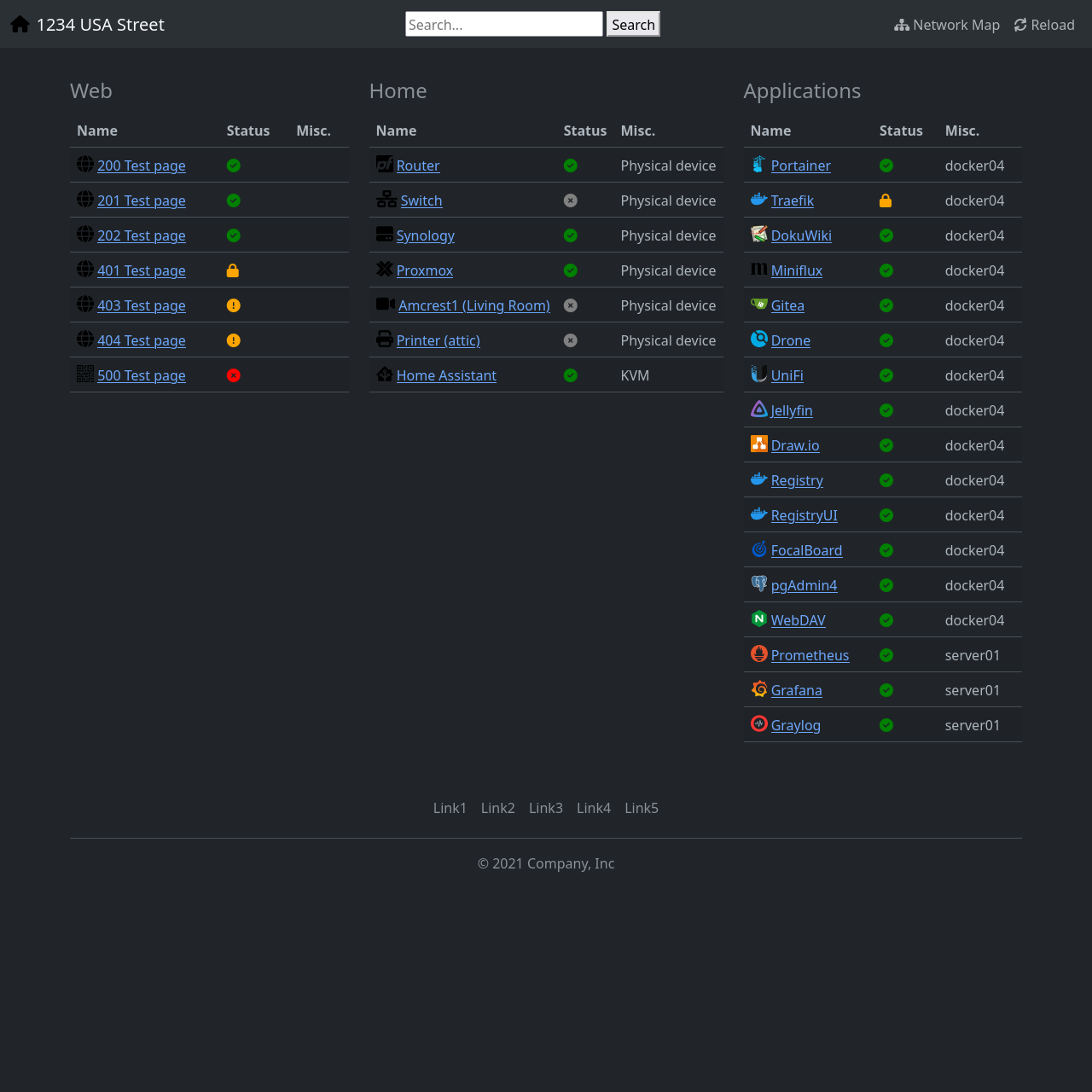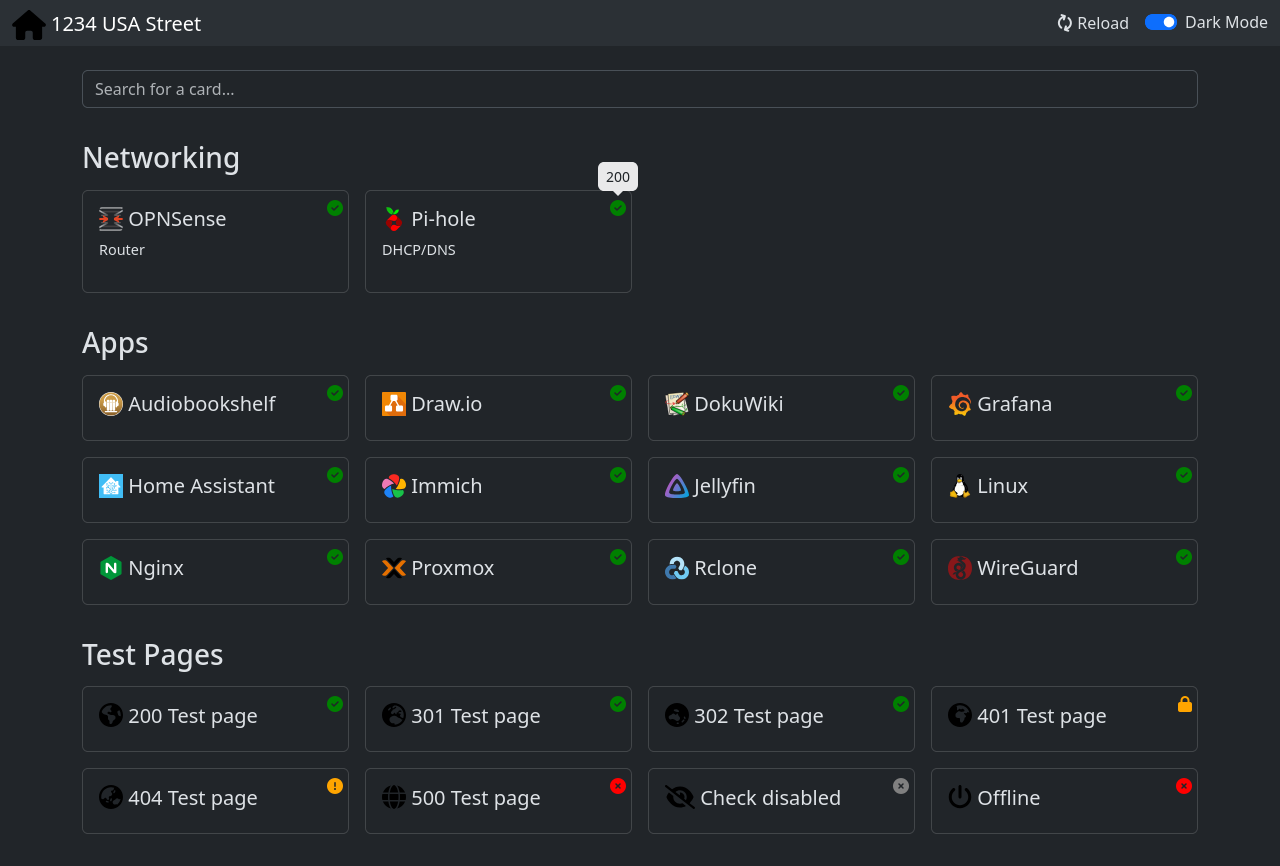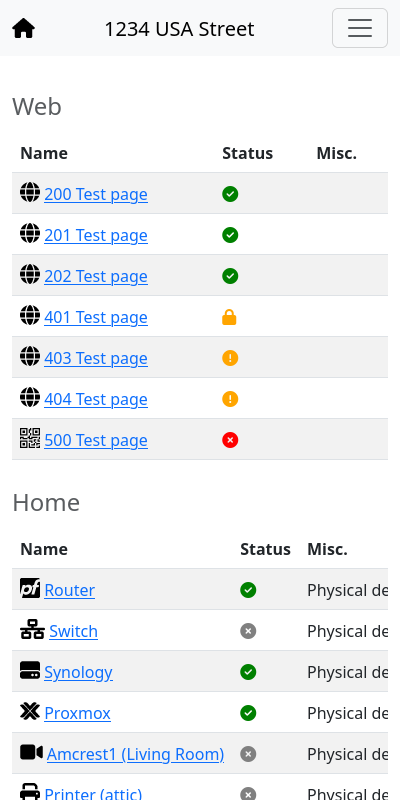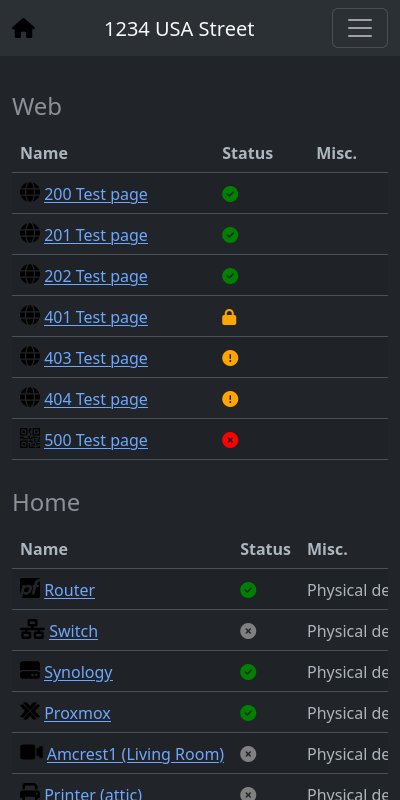- Custom configuration files
- JSON-based configuration file
- Global configuration options
- Group/service configuration options
- Custom user includes
- Custom links in navbar
- Custom footer
- Custom CSS
- JSON-based configuration file
- Dark mode
- Card search
- HTTP status checks
- Mobile-friendly
- Icon packs
The startpage works out of the box, but it's assumed the user will mount a Docker volume at /var/www/html/user_includes to include custom configuration files. The configuration filenames are below (the filenames must be spelled exactly like below). These files are only loaded if they exist inside the user_includes directory. If they are not present (or misspelled), they are not loaded.
user_includes
├── config.json
├── footer.html
├── header_links.html
└── style.css
/var/www/html/user_includes can be served by Apache. Don't put anything containing usernames/passwords/etc... in this directory.
The configuration file (config.json) has two sections:
- Global configuration options
- Groups (this a an array which contains another array of services)
Below is the layout of the global options, with some notes. The options shown below happen to be the defaults.
{
"page_title": "Dashboard", # sets the HTML <title> of the page
"navbar_title_image": "./vendor/fortawesome/font-awesome/svgs/solid/house.svg", # sets the image in the navbar (to the left of the main navbar title)
"navbar_title": "1234 USA Street", # sets the main navbar title (to the right of the navbar image)
"favicon": "./vendor/fortawesome/font-awesome/svgs/solid/house.svg", # sets the HTML "favicon" (it's actually a SVG file, not an ICO file)
"link_target": "_self", # sets the HTML <a> target attribute (e.g., _self or _blank)
...
...
...
}
Below is the layout of the group/service options, with some notes.
...
...
...
"Groups": {
"Test Pages": {
"200test": { # The name of the config (this needs to be unique per group)
"name": "200 Test page", # The name to display on the page
"href": "https://httpstat.us/200", # The link of the URL displayed above
"icon": "./vendor/fortawesome/font-awesome/svgs/solid/earth-americas.svg", # The path to the SVG icon
"stat": true, # True or false to perform a status check
"misc": "" # Extra info that can go in the card (this can be raw HTML)
},
"301test": {
"name": "301 Test page",
"href": "https://httpstat.us/301",
"icon": "./vendor/fortawesome/font-awesome/svgs/solid/earth-europe.svg",
"stat": true,
"misc": ""
},
...
...
...
These files are only loaded if they exist inside the user_includes directory. If they are not present (or misspelled), they are not loaded.
The header_links.html file contains the HTML used to add extra links to the navbar. Populate it as needed.
<li class="nav-item">
<a class="nav-link" href="#" target="_blank"><i class="fas fa-sitemap"></i> Link1</a>
</li>
<li class="nav-item">
<a class="nav-link" href="#" target="_blank"><i class="fas fa-globe"></i> Link2</a>
</li>
The file footer.html contains the HTML used in the footer. Populate it as needed.
<footer class="footer mt-auto py-3 bg-body-tertiary">
<div class="container"></div>
<ul class="nav justify-content-center border-bottom pb-3 mb-3">
<li class="nav-item"><a href="#" class="nav-link px-2 text-muted">Link1</a></li>
<li class="nav-item"><a href="#" class="nav-link px-2 text-muted">Link2</a></li>
<li class="nav-item"><a href="#" class="nav-link px-2 text-muted">Link3</a></li>
<li class="nav-item"><a href="#" class="nav-link px-2 text-muted">Link4</a></li>
<li class="nav-item"><a href="#" class="nav-link px-2 text-muted">Link5</a></li>
</ul>
<p class="text-center text-muted">© 2024 Company, Inc</p>
</div>
</footer>
The CSS in style.css is loaded after Bootstrap, Font Awesome, and the default CSS. Anything you put in here will overwrite CSS above it. Populate it as needed.
body {
color: #212529;
background-color: #f8f9fa;
background-size: 10px 10px;
background-image:
linear-gradient(to right, #ccc 1px, transparent 1px),
linear-gradient(to bottom, #ccc 1px, transparent 1px);
min-height: 100vh;
}
Bootstrap 5.3.0 supports dark mode. Currently, the default is set to dark (as God intended), but can be set to light via a toggle.
A simple Javascript-based search is included to search for cards (it only searches the card title). I'm not a Javascript-person, so I'm open to feedback on this.
In the config.json file, when "stat": true, PHP will use get_headers to perform a quick check of the HTTP status code of the supplied href.
...
...
...
"Groups": {
"Test Pages": {
"200test": {
"name": "200 Test page",
"href": "https://httpstat.us/200",
"icon": "./vendor/fortawesome/font-awesome/svgs/solid/earth-americas.svg",
"stat": true,
"misc": ""
},
...
...
...
Based on the status code returned, it will display the following icons. When "stat": false, the check is skipped and a Gray X is displayed.
200 - 300 = Green check
401 = Orange lock
400 - 499 = Orange exclamation
500 - 599 = Red X
Everything else = Red X
You can hover over the status icon to see a tooltip containing the status code.
Bootstrap is delivered inside the container image. This makes the image larger, but means that Bootstrap is not loaded from an external third-party CDN.
I am not a web developer (clearly), so using Bootstrap ensures that the page works well on desktop and mobile, as well as having a familiar look and feel (e.g., navbar, hamburger menu on mobile, footer, etc...).
Icons from the following sources are delivered inside the container image. This makes the image larger, but means that icons are not loaded from an external third-party CDN. You can switch between icon packs by changing the path to each SVG file in the config.json.
| Icon pack | Example icon path for user_includes/config.json |
|---|---|
| Bootstrap Icons | ./vendor/twbs/bootstrap-icons/icons/qr-code.svg |
| Font Awesome (free) | ./vendor/fortawesome/font-awesome/svgs/solid/globe.svg |
| Homelab SVG assets | ./vendor/loganmarchione/homelab-svg-assets/assets/linux.svg |
| Simple Icons | ./vendor/simple-icons/simple-icons/icons/homeassistant.svg |
